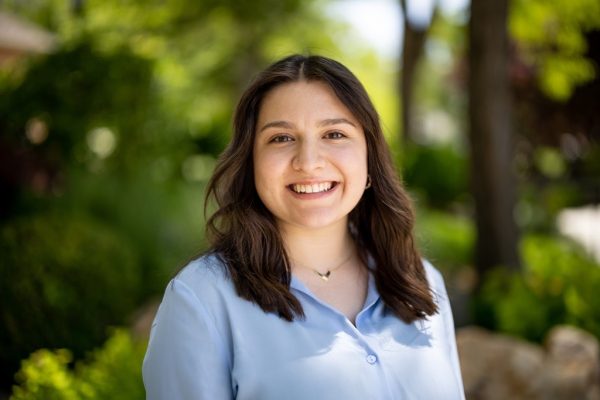College of Humanities to Launch ‘Great Books’ Course for First-Year U Students

The Carolyn Tanner Irish Humanities Building at the University of Utah on Feb. 16 2023. (Photo by Sophie Felici | The Daily Utah Chronicle)
March 9, 2023
The College of Humanities at the University of Utah is unveiling a new course for first-year students, Great Books in the Humanities, which will explore the seven different departments within the college: philosophy, English, linguistics, communication, world languages and cultures, history, and writing and rhetoric studies.
The Great Books course will launch in Fall 2023 to first-year students at the U. The course will feature texts from each humanities department to be read and discussed.
An instructor from each of the seven different departments will have about two weeks to teach their book, and within that timeframe, students will hear lectures, attend small group discussions and critically analyze each text.
Dean of the College of Humanities Hollis Robbins said the course gives new opportunities to both faculty and students. She said professors usually prefer to teach upper-level seminar classes and first-year students don’t often get a chance to learn from top professors.
“This gives our seasoned faculty, our really prestigious faculty, a chance to be in the classroom with first-year students, and it gives first-year students a chance to be in classes with some of our most prestigious professors,” she added.
In an email interview, Michael Middleton, associate dean of academic affairs in the College of Humanities, said the hope is the Great Books program will be a transformative experience for students.
“Humanities is not only the place to explore ideas that have challenged individuals and communities historically and in contemporary times but also the place where they can develop critical skills that will sustain their professional and intellectual aspirations,” he said.
Robbins said the course will allow students who may be unsure of what they want to do to get a glimpse into the humanities as a whole. “The best thing for first-year students is really to see the quality of our faculty in humanities and to see the options in the variation and the breadth of the kind of work that we do,” she said.
Middleton explained that Robbins had taught in a Great Books program while she worked at Johns Hopkins University. “She is still in touch with several of her students from more than ten years ago and it is that potential for lifelong connection that motivated her to suggest launching a Great Books program at the U,” he added.
Robbins said students have so many choices when it comes to what interests them and which classes to take and this class will enable students to get a good idea of what kinds of professors there are.
“It’s like a buffet table of our great professors, and you’ll have a better sense going forward of what interests you the most,” she added.
According to Middleton, there are three goals for this course: provide a foundational humanities course introducing students to the humanities, encourage students to explore majors and minors in a humanities field while making progress toward their general education requirements and share analytical and critical thinking skills that help support the successful careers of humanities alumni.
“We are excited to introduce U students to global texts and the ways Humanities fields differ from – and relate to – one another, demonstrating why the College of Humanities is ‘where ideas connect,’” he said.
For students interested in the course, here are the seven books to be taught throughout the class:
In the philosophy department, Erin Beeghly will teach “The Epistemology of Resistance,” by José Medina.
“Mrs. Dalloway,” by Virginia Woolf, will be taught by Scott Black from the English department.
Nora Ellen Groce’s “Everyone Here Spoke Sign Language” will be taught by Aaron Kaplan from the linguistics department.
Sean Lawson from the communication department will teach “Speaking into the Air: A History of the Idea of Communication,” by John Durham Peters.
“On the Origin of Species,” by Charles Darwin, will be taught by Rachel Dentinger from the history department.
Franz Kafka’s “The Trial” will be taught by Joe Metz from the world languages and cultures department.
“The Fire Next Time,” by James Baldwin will be taught by Maximilian Werner from the writing and rhetoric studies department.








rolling ball 3d • Mar 9, 2023 at 9:20 pm
Grest interested post! thanks